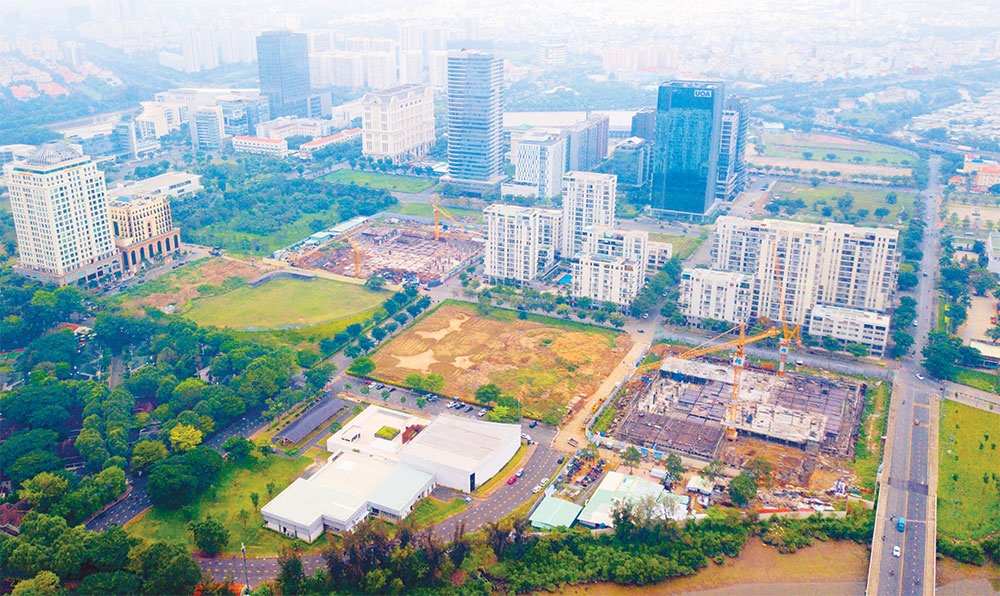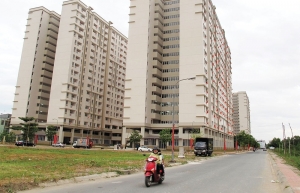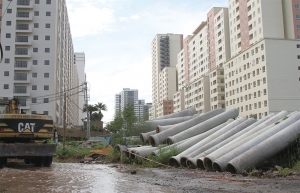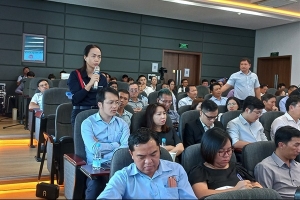Foreign-invested enterprises bemoan housing legal overlaps
The Vietnam General Confederation of Labour (VGCL) has once again proposed that the government makes changes to Decision No.655/QD-TTg on housing in trade union institutions in industrial parks (IPs) and economic zones. The VGCL wants to have a harmonious cooperation mechanism between the VGCL, the people’s committee of localities and investors to build housing projects in trade union institutions in IPs.
 |
| Around half of Vietnam’s provinces have sites that can be used for trade union institutional housing, photo Le Toan |
Le Van Nghia, head of the VGCL’s Project Management Board, noted that the 2017 decision approved projects to build trade union institutes in IPs. A trade union institution comprises a housing complex with cultural amenities, sports, kindergarten, and other aspects.
Nghia said that the confederation deployed the first such institute in the northern province of Ha Nam, but after finishing the first phase in 2019, it had to stop and adjust the entire project as the Law on Land regulated that socio-political organisations, including trade unions, are not allowed land to build social or worker housing projects.
According to the VGCL, 34 provinces introduced sites that could be used to build such institutes in their localities. However, work could not begin on these complexes because of planning issues and legal overlaps.
Explaining the barrier in implementing housing in trade union institutions, the head of the trade union of a South Korean-owned shoe manufacturer in the southern province of Dong Nai told VIR that the number of migrant workers in IPs are increasing, building up demand for accommodation and other utilities.
Thus, the VGCL proposed the government to establish trade union institutions to meet workers’ demands. According to the government’s approval, the VGCL would provide capital while localities and manufacturers would allocate land funds.
“The purpose was to provide low-cost accommodation for workers. However, during the implementation process, it may have a benefit conflict, in which real estate developers pay attention to the benefits from allocating land funds, instead of handing over land for free. This conflict has delayed the process of building housing in trade union institutions,” the union head explained.
A representative of a Bac Ninh industrial real estate developer said, “Many foreign-invested enterprises (FIEs) in our IPs are expecting new moves about housing for employees. The demand is considerable because major FIEs pay attention to the welfare and accommodation of their employees and expats. The problem is that the land in IPs is scarce, thus many industrial real estate developers want to use service land to build workshops to rent out. Enterprises hope that the VGCL’s proposal will be approved soon to extend housing for employees in IPs,” the representative said.
Statistics from the VGCL showed that approximately seven million labourers are working in 370 IPs and export and processing zones across the country. However, current housing is modest, just meeting approximately 30 per cent of demand. As of February, there were 63,000 apartments for workers in IPs.
Also in February, Prime Minister Pham Minh Chinh required relevant ministries and the State Bank of Vietnam to take measures to handle issues relating to housing for workers, including proposals to adjust land planning, incentive loans, and relevant procedures.
Furthermore, Decree No.35/2022/ND-CP dated May 2022 on the management of IPs and related zones in Vietnam also pays attention to the development of worker housing. The decree regulates that industrial real estate developers have to spend at least 2 per cent of the total IP area for residential aspects.
To be considered and approved for policies and IP infrastructure projects, developers must have planning to build residential areas, public services, and utility works for employees. In addition, putting into use housing and service facilities and public utilities for workers is one of the conditions for consideration of IP expansion.
 | More than rhetoric needed for dilemmas in social housing The majority of developers are finding it extremely difficult to generate a profit under current social housing laws. VIR’s Quynh Trang found out more on this issue with Troy Griffiths - Deputy managing director of Savills Vietnam. |
 | Social housing market glacier melting As a number of new laws and social housing loan packages are implemented towards the end of the second quarter, the real estate market in Vietnam is hoping for a rebound. |
 | Attraction some way off for social housing The lack of affordable social housing has raised whether foreign developers should be allowed to invest in this segment in Vietnam. |
 | KoCham raises foreign workers residence issue at VBF The ongoing issue of residence rights of foreign workers in industrial zones (IZs) has been raised at the Vietnam Business Forum (VBF), highlighting the concerns of the Korean business community. |
What the stars mean:
★ Poor ★ ★ Promising ★★★ Good ★★★★ Very good ★★★★★ Exceptional
Related Contents
Latest News
More News
- Construction firms poised for growth on public investment and capital market support (February 11, 2026 | 11:38)
- Mitsubishi acquires Thuan An 1 residential development from PDR (February 09, 2026 | 08:00)
- Frasers Property and GELEX Infrastructure propose new joint venture (February 07, 2026 | 15:00)
- Sun Group led consortium selected as investor for new urban area (February 06, 2026 | 15:20)
- Vietnam breaks into Top 10 countries and regions for LEED outside the US (February 05, 2026 | 17:56)
- Fairmont opens first Vietnam property in Hanoi (February 04, 2026 | 16:09)
- Real estate investment trusts pivotal for long-term success (February 02, 2026 | 11:09)
- Dong Nai experiences shifting expectations and new industrial cycle (January 28, 2026 | 09:00)
- An Phat 5 Industrial Park targets ESG-driven investors in Hai Phong (January 26, 2026 | 08:30)
- Decree opens incentives for green urban development (January 24, 2026 | 11:18)

 Tag:
Tag:





















 Mobile Version
Mobile Version